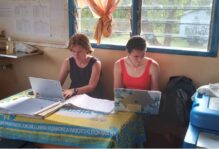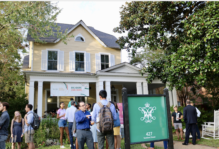Learning From the Best: Reflections on the International Justice Lab
This is the second installment of a series highlighting exceptional student contributions to the Global Research Institute. Stay tuned for other features throughout April: Undergraduate Research Month. The International Justice Lab brings together faculty and students from across the United States to conduct collaborative research on human rights, transitional justice, and international law and courts.
By Daniel Posthumus ’24
My freshman year looked unusual — not only were all my classes on Zoom, but I was taking them at midnight from my childhood bedroom in Japan. This wasn’t the college experience I had dreamed of, but W&M’s uniqueness helped make me feel welcome, even if the Wren Building was on the other side of the world. For one, I was participating in high-level research with the International Justice Lab at the Global Research Institute — an impossibility at any other school in the country for a first-year undergraduate student. Every Tuesday morning at 6 AM, I would log onto Zoom and get to work with my brilliant peers in the lab — all guided by our incredible research mentor and IJL Director Dr. Kelebogile Zvobgo. Those Tuesday mornings, I felt like I was home.
My first assignment with the lab was simple: collect a literature corpus on scholarly work about the Commission on the Wartime Relocation and Internment of Civilians (CWRIC), a Truth Commission in the 1980s about WWII-era illegal displacement and imprisonment of Japanese-American civilians. That spiraled into looking at past US truth commissions, which spiraled into an opportunity to write a paper with Dr. Zvobgo about subnational Truth Commissions here in the US: a completely unprecedented and untouched research topic.
I spent much of the next few months immersed in this work — first spending endless hours compiling data before discussing the framing of my paper with Dr. Zvobgo. Working with an experienced leader in the field of Transitional Justice, like Dr. Zvobgo, was an incredible opportunity. I believe the best way to learn research is by doing research — and the best way to do research is by doing research with the best.
Eventually, we got to a place where we felt comfortable submitting the piece to a journal, and we chose Oxford’s International Journal of Transitional Justice. After a painfully long wait, we received the good news: a “R and R,” or revise and resubmit. After a brief time spent looking at reviewers’ suggested edits, we resubmitted and received notice that we were accepted for publication. In hindsight, the whole process seems incredibly quick; however, at the time, we went through the gauntlet of preparing the paper and our work.
Now, I’m working on a follow-up paper with Dr. Zvobgo and my fellow Research Fellows Zoha Siddiqui, Sally Calengor, and Nathaniel Liu about agenda-setting for the truth commissions part of the dataset we introduced in our initial paper, or how public opinion is transformed into concrete policy achievements. We’re utilizing a detailed mixed-methods process, including elite qualitative interviews, mass public opinion surveys, quantitative analysis, and process tracing.
In addition to the strictly academic work, I’ve also had the opportunity to become involved in public scholarship with Dr. Zvobgo. Russia’s illegal invasion of Ukraine has led to a heightened interest in and focus on international institutions and international multilateralism. In general, however, the media was struggling to explain some of the particular actions by international institutions — such as the International Criminal Court and the International Court of Justice. So, Dr. Zvobgo, two of my fellow Research Fellows Nathaniel Liu and Zoha Siddiqui, and myself wrote an article, published in Foreign Policy, examining whether the International Criminal Court would be able to hold Russian President Vladimir Putin accountable. Dr. Zvobgo and I also co-authored an article, published in The Washington Post, about the International Court of Justice’s recent decision ordering Russia to halt its invasion.
Writing these articles was another incredible experience. Dr. Zvobgo has written extensively for popular media sources and appeared on NPR, Bloomberg, and ABC to discuss current events for an audience much broader than the ones who just read our strictly academic work. Learning to transmit these complex ideas succinctly and sans the academic jargon is an incredibly valuable skill widely applicable.
I’ve loved every minute of my participation with the International Justice Lab. I’ve learned so much from Dr. Zvobgo and my incredible peers. It has opened so many doors to me, and I’m incredibly thankful for the opportunity to do what I’ve been doing and what I’m passionate about.
Follow along on Twitter for more IJL research.




No comments.
Comments are currently closed. Comments are closed on all posts older than one year, and for those in our archive.